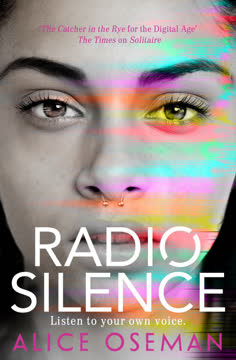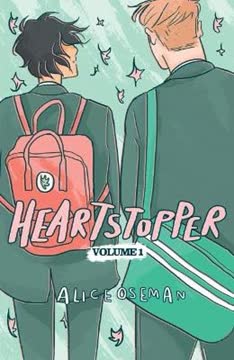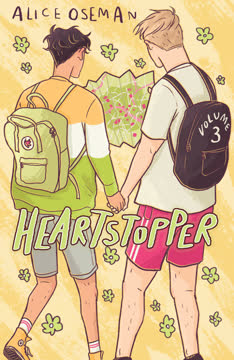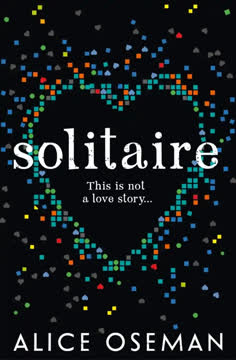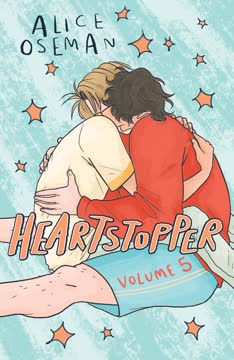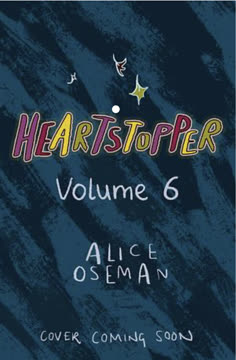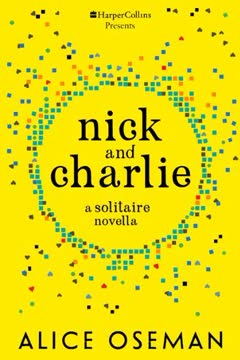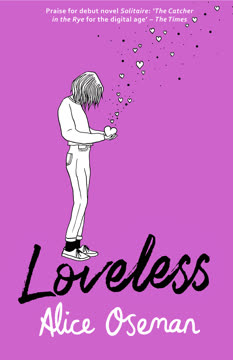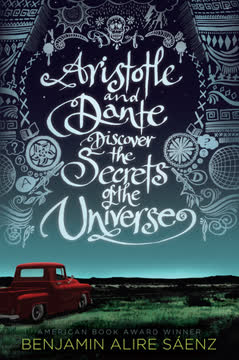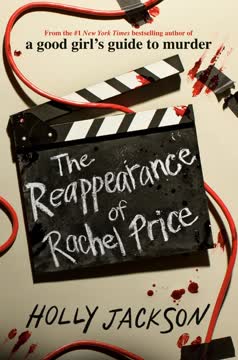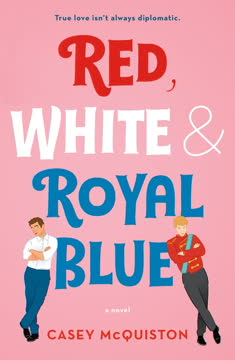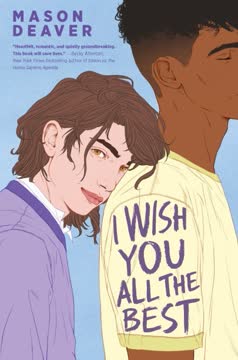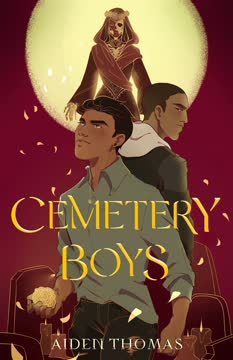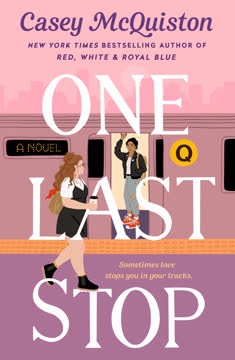Plot Summary
Train Platform Smoke
Frances Janvier and her friend Carys Last stand on a snowy train platform, music in their ears, when they notice their school is burning. The fire, likely caused by pranksters, destroys not just buildings but the hard work and futures of many students. This moment marks the beginning of upheaval in Frances's life, setting her on a path where the stability of school and the expectations of academic success are suddenly thrown into question. The fire is both literal and symbolic, foreshadowing the coming disruptions in Frances's carefully planned world and the relationships that will define her journey.
Clever Girl, Secret Artist
At school, Frances is the model student: head girl, top of her class, and destined for Cambridge. Yet, beneath this exterior, she's obsessed with the YouTube podcast Universe City, secretly creating fan art under the alias "Toulouse." When the show's mysterious creator, "Radio," reaches out to her online, Frances is both thrilled and terrified. She's offered a chance to contribute her art to the show, but worries about time, exposure, and what her peers would think. Her mother encourages her to take the opportunity, pushing Frances to do something for herself, not just for her academic record. This marks the first crack in Frances's "School Frances" persona.
Universe City Connection
At a club, Frances encounters Aled Last, a quiet boy she barely knows but who is connected to her past through his twin sister, Carys. After a drunken night, Aled ends up in Frances's bed (platonically), and the two discover a shared love for Universe City. In a moment of vulnerability, Aled reveals he is the creator of the podcast. Frances, in turn, admits she is the fan artist he's been corresponding with. Their mutual secrets forge a deep, immediate bond, and they begin collaborating on the show, finding in each other the acceptance and understanding they lack elsewhere.
Drunk Confessions, New Friends
Frances and Aled's friendship deepens as they spend more time together, both online and in person. They share their quirks, insecurities, and creative passions, finding comfort in their similarities and differences. Their connection is platonic but intense, challenging the expectations of their peers and themselves. As they work on Universe City, they navigate the pressures of school, family, and identity, learning to trust each other with their vulnerabilities. Their friendship becomes a safe haven, a place where they can be their true selves without fear of judgment.
Shared Secrets, Shared Beds
Frances and Aled's relationship is marked by a profound emotional intimacy that defies traditional labels. They share beds, secrets, and creative projects, but their bond is never romantic. Instead, it's a testament to the power of friendship and the importance of finding someone who truly understands you. Their connection is tested by misunderstandings, external pressures, and the lingering shadows of their pasts, but they remain committed to supporting each other, even when it's difficult.
Becoming Real Friends
As Frances and Aled grow closer, they begin to shed the personas they've constructed to survive in their respective worlds. Frances learns to embrace her "Real Frances" self, letting go of the need to be perfect and allowing herself to pursue what she truly loves. Aled, in turn, confronts his own fears and insecurities, learning to trust Frances and open up about his struggles. Their friendship becomes a catalyst for personal growth, inspiring them to challenge the expectations that have been imposed on them.
Power and Family Shadows
Both Frances and Aled grapple with the influence of their families. Frances's mother is supportive but unconventional, encouraging her to pursue happiness over achievement. Aled's mother, Carol, is controlling and emotionally abusive, fixated on academic success and dismissive of anything she deems unworthy. The absence of Carys, who ran away after a traumatic falling out with Frances, haunts both siblings. The legacy of family expectations and trauma looms large, shaping their choices and their sense of self.
Internet Fame, Real-World Fallout
Universe City's popularity explodes after a viral episode, thrusting Aled and Frances into the spotlight. The fandom's obsession with uncovering the creator's identity leads to Aled being outed, despite Frances's attempts to protect him. The attention is overwhelming and invasive, resulting in harassment, doxxing, and a loss of privacy. The pressure takes a toll on Aled's mental health, and Frances is forced to confront the unintended consequences of their creative success.
School Frances vs. Real Frances
The revelation of Frances's involvement with Universe City leads to her being removed as head girl, further eroding her "School Frances" identity. She struggles to reconcile her academic ambitions with her creative passions, feeling increasingly alienated from her school friends, who only know her as the studious, reliable overachiever. The tension between who she is and who she's expected to be becomes unbearable, forcing her to make difficult choices about her future.
Friendship Breakdowns
The strain of fame, family, and personal struggles leads to a breakdown in Frances and Aled's friendship. Hurtful words are exchanged, and both retreat into isolation, convinced they've lost the only person who truly understood them. Aled's mental health deteriorates as he withdraws from everyone, including his boyfriend Daniel and his estranged sister Carys. Frances, wracked with guilt and self-doubt, is left to pick up the pieces and figure out how to make things right.
The Weight of Silence
As Aled disappears into depression and silence, Frances becomes determined to help him, realizing that the only person who might reach him is Carys. With the help of her friend Raine and her mother, Frances tracks down Carys, who is living under the name February in London. The reunion is fraught with unresolved guilt and pain, but ultimately, Carys agrees to help her brother, recognizing the depth of his suffering and the need for family, however imperfect.
Finding February Friday
Frances and Carys, joined by Raine and Daniel, embark on a road trip north to Aled's university, determined to rescue him from his toxic home life and the pressures that are crushing him. The journey is both literal and metaphorical, as each character confronts their own fears, regrets, and hopes for the future. The reunion with Aled is emotional and cathartic, as long-held secrets are finally spoken and the possibility of healing emerges.
Rescue Mission North
The group arrives at Aled's university to find him in a state of despair, his room a mess and his spirit broken by hate mail and academic pressure. When his mother arrives to take him home, Frances and her friends intervene, convincing Aled that he has other options and doesn't have to return to a place that hurts him. In a dramatic moment at the train station, Aled chooses his friends and his own well-being over his mother's control, stepping off the train and reclaiming his agency.
Facing the Past
With Aled safe, the group spends the night together, sharing stories, apologies, and new understandings. Daniel and Aled reconcile, clarifying the nature of their relationship and the complexities of sexuality and attraction. Frances and Carys make peace with their past, acknowledging the pain they caused each other and the ways they've both grown. The power of listening, honesty, and forgiveness is affirmed as the foundation for moving forward.
Choosing Your Own Future
Frances realizes she no longer wants to pursue English literature at university, choosing instead to follow her passion for art. Aled, freed from his mother's influence, decides to continue Universe City on his own terms. The friends support each other in making choices that reflect their true selves, rather than the expectations of family, school, or society. The message is clear: happiness and fulfillment come from authenticity, not conformity.
Universe City Reborn
Universe City returns, stronger and more personal than ever, as Aled and Frances collaborate on new episodes and art. Their story inspires others, both in their immediate circle and in the wider online community, to embrace their differences and pursue what makes them happy. The novel ends with Aled's triumphant live performance, surrounded by fans and friends, and Frances's acceptance into art college—a celebration of chosen family, creative passion, and the courage to be yourself.
Characters
Frances Janvier
Frances is a high-achieving, mixed-race British-Ethiopian girl who has built her identity around academic success and the approval of authority figures. Beneath this exterior, she is creative, quirky, and deeply passionate about the podcast Universe City, for which she secretly creates fan art. Frances's journey is one of self-discovery, as she learns to reconcile her public persona ("School Frances") with her authentic self. Her friendship with Aled allows her to embrace vulnerability, creativity, and queerness, ultimately leading her to reject the path laid out for her and choose her own future.
Aled Last
Aled is a shy, introverted boy who lives across the street from Frances. He is the creator of Universe City, a podcast that serves as both his creative outlet and a coded cry for help. Aled is haunted by family trauma, particularly the emotional abuse of his mother and the disappearance of his twin sister, Carys. He struggles with mental health, sexuality (eventually identifying as demisexual/asexual), and the pressures of academic achievement. His friendship with Frances is transformative, providing him with the support and understanding he desperately needs.
Carys Last / February Friday
Carys is Aled's twin and Frances's former friend. She ran away from home after a falling out with Frances and years of emotional abuse from their mother. Living under the name February in London, Carys has built a new life for herself, free from the expectations that once suffocated her. Her return is crucial to Aled's recovery, as she represents both the pain of the past and the possibility of reconciliation. Carys's journey highlights the importance of self-preservation, chosen family, and the courage to break cycles of harm.
Daniel Jun
Daniel is Aled's childhood best friend and, at times, his romantic partner. He is also Frances's academic rival and fellow head student. Daniel is driven, competitive, and deeply caring, but struggles with communication and vulnerability. His relationship with Aled is complicated by unspoken feelings, misunderstandings, and the pressures of coming out. Daniel's arc is one of learning to accept change, let go of the past, and support those he loves, even when it hurts.
Raine Sengupta
Raine is Frances's school friend, known for her bold style, sharp wit, and refusal to conform. She becomes an unexpected but invaluable ally in the quest to help Aled, using her resourcefulness and lack of respect for authority to get things done. Raine's presence challenges Frances to be more honest and assertive, and her friendship is a reminder that support can come from unexpected places.
Carol Last
Carol is Aled and Carys's mother, whose obsession with academic success and emotional manipulation has left deep scars on both her children. She is a complex antagonist, embodying the dangers of conditional love and the destructive power of parental expectations. Carol's actions drive much of the conflict in the novel, forcing her children to choose between survival and self-actualization.
Frances's Mum
Frances's mother is a source of warmth, humor, and unconditional support. She encourages Frances to pursue happiness over achievement and is instrumental in helping her daughter and her friends navigate crises. Her presence is a counterpoint to Carol's, demonstrating the importance of acceptance and open communication in family relationships.
Maya and School Friends
Frances's school friends represent the pressures of conformity and the limitations of relationships built on shared environments rather than genuine understanding. Their inability to see beyond "School Frances" highlights the loneliness that can come from hiding one's true self.
Universe City Fandom
The fandom surrounding Universe City is both a source of validation and a threat, reflecting the double-edged nature of internet fame. Their enthusiasm, creativity, and passion are inspiring, but their invasiveness and entitlement cause real harm to Aled and Frances, illustrating the complexities of online identity and privacy.
The School System
The educational institutions in the novel serve as a backdrop for the characters' struggles, embodying the pressures, hierarchies, and lack of empathy that can make young people feel trapped and unseen.
Plot Devices
Dual Identity and Anonymity
Both Frances and Aled maintain secret identities—Frances as "Toulouse" the fan artist, Aled as "Radio" the podcast creator. This device explores the tension between public and private selves, the safety and danger of anonymity, and the liberation that comes from being truly seen. The gradual revelation of these identities to each other and the world drives much of the plot and character development.
Internet and Fandom Culture
The novel uses the world of online fandom to explore themes of belonging, creativity, and the risks of exposure. The internet is a place where characters can express themselves freely, but it also magnifies scrutiny, misunderstanding, and harassment. The rise and fall of Universe City's popularity, and the fandom's obsession with uncovering secrets, serve as both plot engine and commentary on digital life.
Parallel Narratives and Metafiction
The podcast within the novel is a metafictional device, with its storylines and mysteries reflecting the characters' own journeys. The search for "February Friday" in the podcast parallels the search for Carys in real life. The podcast's themes of escape, identity, and resistance to authority echo the characters' battles with family, school, and societal expectations.
Non-Romantic Intimacy
The story subverts the expectation that a boy and girl protagonist must fall in love. Frances and Aled's relationship is deeply intimate but never romantic, challenging traditional narratives and affirming the value of platonic love. This device allows for nuanced exploration of sexuality, gender, and the many forms of connection.
Family Trauma and Cycles of Harm
The impact of Carol's abuse, the absence of Carys, and the contrast with Frances's supportive mother all serve to examine how family dynamics can both wound and heal. The characters' efforts to break free from harmful patterns and redefine family on their own terms are central to the plot.
Rescue and Road Trip Structure
The climactic road trip to save Aled from his mother and university is both a literal and symbolic rescue mission. It brings together disparate characters, forces confrontations with the past, and culminates in acts of courage and self-determination.
Foreshadowing and Symbolism
The recurring motifs of fire (destruction and renewal), trains (journeys and transitions), and the color blue (melancholy, hope, and the unknown) are woven throughout the narrative, deepening its emotional resonance and connecting the characters' experiences.
Analysis
Radio Silence is a novel about the courage to be yourself in a world that constantly tries to define you. Through the intertwined stories of Frances, Aled, and their friends, Alice Oseman explores the pressures of academic achievement, the complexities of online life, and the deep need for authentic connection. The book challenges the myth that success and happiness are found by following prescribed paths, instead advocating for self-discovery, creative passion, and the importance of friendship over romance. It is a story for anyone who has ever felt out of place, who has hidden parts of themselves to fit in, or who has longed for someone to truly listen. In a culture obsessed with achievement and visibility, Radio Silence is a call to embrace vulnerability, reject conformity, and find your own voice—no matter how quietly it begins.
Last updated:
FAQ
Synopsis & Basic Details
What is Radio Silence about?
- Aled's Secret Podcast: Radio Silence follows Frances Janvier, a high-achieving, academically driven teenager secretly obsessed with "Universe City," a quirky sci-fi YouTube podcast. Her life takes an unexpected turn when she discovers the podcast's creator, "Radio Silence," is her quiet, enigmatic neighbor, Aled Last.
- Unlikely Friendship Forms: Their shared secret and passion for "Universe City" forge an intense, platonic friendship, allowing both Frances and Aled to explore their authentic selves beyond societal and familial expectations. They navigate the pressures of school, identity, and the complexities of online fame as their collaboration on the podcast deepens their bond.
- Finding Your Own Path: The narrative delves into themes of self-discovery, mental health, and the search for belonging, culminating in a powerful story about rejecting conventional paths, embracing creative passion, and the profound importance of chosen family and genuine connection in a world that often demands conformity.
Why should I read Radio Silence?
- Authentic Platonic Intimacy: The novel masterfully portrays a deep, non-romantic intimacy between a boy and a girl, challenging traditional narrative expectations and offering a refreshing take on connection. Readers seeking nuanced relationships will find Frances and Aled's bond incredibly resonant.
- Exploration of Internet Culture: Alice Oseman provides a keen, insightful look into online fandom, anonymity, and the double-edged sword of internet fame, making it highly relevant for anyone who has grown up with or engaged deeply in digital communities. The story captures both the joy and the peril of online life.
- Powerful Message of Self-Acceptance: Radio Silence is a poignant coming-of-age story that encourages readers to question societal pressures, particularly around academic success and career paths. It champions the courage to pursue personal happiness and creative fulfillment over external validation, resonating deeply with those struggling to find their true voice.
What is the background of Radio Silence?
- Author's Personal Inspiration: Alice Oseman, herself a young author who gained recognition through online platforms, drew heavily from her experiences with internet culture and the pressures faced by teenagers. The novel reflects her observations of Tumblr fandoms and the complexities of online identity, as noted in the acknowledgements: "significantly inspired by behavioural trends on Tumblr."
- Critique of Educational Systems: The book implicitly critiques the British education system's intense focus on university and academic achievement, particularly Oxbridge. Characters like Frances and Daniel are pushed to their limits, highlighting the mental health toll of such pressures, while Aled's mother embodies the extreme parental expectations prevalent in this environment.
- Published in 2016: Radio Silence was published in 2016, following Oseman's debut novel Solitaire. Its contemporary setting and themes resonate with the experiences of Gen Z, capturing the anxieties and aspirations of young people navigating a rapidly evolving digital and social landscape.
What are the most memorable quotes in Radio Silence?
- "Hello. I hope somebody is listening.": This iconic opening line of the "Universe City" podcast, repeated throughout the novel, encapsulates Aled's deep-seated loneliness and his desperate, often unspoken, cry for connection and understanding. It highlights the core theme of the human need to be heard and seen.
- "I just … want to be special.": Aled's vulnerable confession reveals his underlying motivation for creating "Universe City" and his struggle with feeling ordinary despite his intelligence. This quote underscores the pressure young people face to stand out and find unique value in themselves beyond conventional achievements.
- "Family means nothing. You have no obligation to love your family. It wasn't your choice to be born.": Spoken by Carys, this powerful and controversial statement reflects her profound trauma and rejection of her abusive mother. It challenges traditional notions of familial duty, emphasizing the importance of chosen family and self-preservation over biological ties.
What writing style, narrative choices, and literary techniques does Alice Oseman use?
- First-Person, Conversational Tone: Oseman employs a highly engaging first-person narrative from Frances's perspective, characterized by an informal, conversational, and often self-deprecating tone. This style, combined with direct address to the reader ("You probably think..."), creates an immediate, intimate connection, making Frances feel like a relatable peer.
- Mixed Media Integration: The novel innovatively incorporates various forms of digital communication, such as Twitter DMs, Facebook messages, Tumblr posts, and podcast transcripts. This not only grounds the story in contemporary internet culture but also provides multiple perspectives and layers of information, reflecting how modern relationships and identities are constructed online.
- Symbolism and Metaphorical Depth: Oseman weaves rich symbolism throughout the narrative, using recurring motifs like the school fire, the color dark blue, and the "Universe City" podcast itself as extended metaphors. The podcast's plot often mirrors the characters' real-life struggles, adding a metafictional layer that deepens the thematic exploration of identity, escape, and the search for meaning.
Hidden Details & Subtle Connections
What are some minor details that add significant meaning?
- Frances's "Sad Computer" Jumper: Early in the novel, Frances wears a jumper with "a computer with a sad face on it," which Carys compliments. This seemingly minor detail subtly foreshadows Frances's hidden, emotional self beneath her "School Frances" persona and her eventual connection with Aled, who later wears a similar "computer with a sad face" T-shirt, symbolizing their shared internal struggles and hidden identities.
- Aled's Lime Green Plimsolls: Aled's distinctive lime green plimsolls with fluorescent purple laces are repeatedly mentioned, becoming a unique identifier for him. This detail is crucial when the fandom uses a blurry photo of his shoes to "reveal" his identity as Radio, highlighting how seemingly insignificant personal quirks can become powerful, identifying markers in the age of online scrutiny.
- The "Burning" Motif: The initial school fire, described by Carys as "Burning," is echoed later when Aled recounts his mother burning Carys's clothes and, metaphorically, when Frances realizes Carol is "burning him, slowly, until he died" by destroying his creative world. This recurring imagery of fire symbolizes destructive control and the painful obliteration of personal joy and identity.
What are some subtle foreshadowing and callbacks?
- Aled's Early "Radio" Quote: When Aled is drunk at Johnny R's, he quotes the opening line of "Universe City": "Hello. I hope somebody is listening." This seemingly random drunken utterance is the first hint of his secret identity as Radio, a subtle foreshadowing that Frances initially dismisses but later realizes is a profound revelation.
- Carys's "We Are Out There" Comment: Carys tells Frances, "We are out there," referring to queer people, after Frances admits she hasn't met any. This not only foreshadows Frances's own bisexuality but also subtly hints at Carys's own hidden identity as "February Friday," a character who is "out there" but unseen, waiting to be found.
- Daniel's "Dae-Sung" Name: Daniel reveals his Korean birth name, Dae-Sung, and his mother's decision to change it to "Daniel" to help him fit in. This detail foreshadows his later struggle with authenticity and his feeling that "Daniel" feels like a "lie," mirroring Aled's own hidden identity and the pressure to conform.
What are some unexpected character connections?
- Raine's Hidden Depth and Empathy: Initially appearing as a cool, somewhat shallow friend, Raine reveals surprising depth and empathy. Her blunt honesty ("He's an absolute cunt") and her ability to perceive Frances's true feelings ("You seem a bit zoned out") show a connection beyond surface-level school friendships, making her an unexpected source of genuine support and a foil to Frances's self-deception.
- Daniel's Vulnerability and Family Struggles: Daniel, initially portrayed as Frances's ruthless academic rival, is revealed to have significant personal struggles, including a difficult relationship with his parents who don't support his academic ambitions. His confession about his "childish kisses" with Aled and his deep emotional pain over Aled's withdrawal humanize him, transforming him from a one-dimensional rival into a complex, sympathetic character.
- Frances's Mum's Subversive Wisdom: Frances's mum is more than just supportive; she actively encourages Frances to break rules and pursue happiness. Her casual "I may possibly have climbed out of the window" comment about Aled's arrival, and her strategic "borrowing" of Carol's Filofax, reveal a surprisingly subversive and resourceful character who subtly guides Frances towards self-liberation.
Who are the most significant supporting characters?
- Raine Sengupta: The Unconventional Confidante: Raine transcends the typical "school friend" archetype by offering Frances blunt honesty and unwavering support, often seeing through Frances's carefully constructed facade. Her willingness to "fake an absence note" and drive them to Cambridge, coupled with her surprising insights into Aled and Daniel's relationship, positions her as a crucial catalyst for Frances's growth and the rescue mission.
- Frances's Mum: The Anchor of Unconditional Love: Far from a conventional parent, Frances's mum provides a vital counterpoint to Carol Last's toxic influence. Her consistent encouragement for Frances to "do what you want," her playful sarcasm, and her active participation in the "Find Carys" plan (e.g., "I asked her if I could borrow it") demonstrate a profound, unconventional love that empowers Frances to embrace her true self.
- Daniel Jun: The Mirror of Shared Pressure: Daniel is more than just Aled's boyfriend or Frances's rival; he embodies the intense academic pressures that both Frances and Aled face. His hidden vulnerability, his deep love for Aled, and his own struggles with parental expectations make him a sympathetic figure who mirrors Frances's journey of self-discovery and the search for authentic connection amidst external demands.
Psychological, Emotional, & Relational Analysis
What are some unspoken motivations of the characters?
- Aled's Need for Control and Secrecy: Aled's intense desire for "Universe City" to remain a mystery and his identity anonymous stems from a deep-seated need for control in a life dominated by his mother's manipulation. His fear that his mum "would make me stop" if she found out reveals that the podcast is his only true space of autonomy and self-expression, a motivation far beyond simple privacy.
- Frances's Fear of Wasting Potential: Frances's relentless pursuit of academic excellence and her Cambridge ambitions are driven by an unspoken fear of "wasting her potential" and a deep-seated need for external validation. Her internal monologue reveals that being "clever" is her "primary source of self-esteem," highlighting a motivation rooted in insecurity rather than genuine passion for her studies.
- Daniel's Search for Reciprocal Love: Daniel's persistence in his relationship with Aled, despite Aled's emotional withdrawal, is motivated by a desperate longing for reciprocal love and understanding. His confession that he "only thinks he does that because he's used to it, because he's comfortable around me and … because he feels sorry for me" reveals his unspoken fear of being loved out of obligation rather than genuine attraction.
What psychological complexities do the characters exhibit?
- Aled's Demisexuality and Avoidant Attachment: Aled's eventual self-identification as demisexual (or partly asexual) explains his difficulty forming romantic attachments beyond deep emotional bonds, and his "flinching" when Daniel first kissed him properly. This, combined with an avoidant attachment style (running away from "difficult things"), creates a complex psychological profile where his emotional unavailability is a coping mechanism for past trauma and a genuine aspect of his identity.
- Frances's Identity Fragmentation and Imposter Syndrome: Frances experiences a profound fragmentation of identity, oscillating between "School Frances" (the perfect, studious head girl) and "Real Frances" (the quirky, fan-art loving individual). Her constant self-doubt and feeling like a "pathetic twat" for her Cambridge disappointment reveal imposter syndrome, where external achievements fail to align with internal self-worth.
- Carys's Trauma-Induced Detachment: Carys's seemingly cold and detached demeanor, particularly her statement "Family means nothing," is a complex psychological defense mechanism developed in response to her mother's emotional abuse. Her initial refusal to help Aled stems from a deep-seated fear that reconnecting with her past will "ruin" the new, stable identity she has painstakingly built for herself.
What are the major emotional turning points?
- Aled's Drunken Revelation of Identity: The moment Aled, in a drunken state, reveals "I am Universe City. I'm Radio Silence," is a pivotal emotional turning point. It shatters Frances's perception of him and creates an immediate, intense bond built on shared vulnerability and secret identities, setting the stage for their deep platonic connection.
- Frances's Cambridge Rejection: Frances's failure to get into Cambridge, despite her lifelong dedication, is a devastating emotional turning point. It forces her to confront the hollowness of her academic pursuits and triggers a profound identity crisis, leading her to question her entire life's direction and ultimately seek a path aligned with her true passions.
- Carol Last's Destruction of Aled's Room and Dog: The discovery of Carol painting over Aled's galaxy ceiling and, more horrifically, having his dog Brian put down, serves as a brutal emotional climax. This act of symbolic and literal destruction pushes Aled to his breaking point, revealing the true extent of his mother's abuse and galvanizing Frances and his friends into a desperate rescue mission.
How do relationship dynamics evolve?
- Frances and Aled: From Coincidence to Chosen Family: Their relationship evolves from an accidental discovery of shared interests into a profound, platonic intimacy. Initially, Frances is a "fangirl" and Aled a "Creator," but they quickly become each other's "most important friend," offering unconditional acceptance and a safe space for their authentic selves, culminating in Aled choosing Frances and his friends over his abusive mother.
- Aled and Daniel: Unspoken Love to Painful Honesty: Their lifelong best friendship is complicated by a hidden romantic and sexual relationship, where Daniel's deep love is met with Aled's demisexual and avoidant tendencies. The dynamic shifts from unspoken understanding to painful arguments and Aled's withdrawal, eventually leading to a raw, honest conversation where Aled articulates his feelings and they begin to rebuild their connection on a foundation of truth.
- Frances and Carys: From Guilt-Ridden Past to Forgiveness: Their relationship is initially strained by Frances's guilt over kissing Carys and Carys's subsequent disappearance. The dynamic shifts when Frances actively seeks Carys out to help Aled, forcing a confrontation with their past. Their shared concern for Aled and Carys's eventual understanding of "February Friday" lead to a fragile but meaningful reconciliation, built on mutual forgiveness and a shared desire to protect Aled.
Interpretation & Debate
Which parts of the story remain ambiguous or open-ended?
- The Future of Frances's Art Career: While Frances decides to pursue art college, the specific trajectory of her artistic career remains open-ended. The novel celebrates her choice to follow her passion, but doesn't guarantee success, leaving readers to imagine her journey beyond the immediate resolution.
- Carys's Long-Term Relationship with Aled: While Carys agrees to help Aled and they reconcile, the long-term nature of their sibling relationship is left somewhat ambiguous. Her initial reluctance to reconnect ("Family means nothing") suggests that healing from deep-seated trauma is a continuous process, and their future bond will require ongoing effort.
- The Fandom's Evolving Role: The "Universe City" fandom is portrayed as both supportive and invasive. While the immediate crisis of doxxing and hate mail is resolved, the novel leaves open the question of how the fandom will evolve with Aled's increased visibility and the show's new direction. It prompts reflection on the ongoing challenges of maintaining privacy and authenticity in public online spaces.
What are some debatable, controversial scenes or moments in Radio Silence?
- Carol Last's Actions, Especially Killing Brian: Carol's character and her actions, particularly cutting Aled's hair and having his dog, Brian, put down, are highly controversial. Readers might debate whether she is purely malicious or a product of her own rigid beliefs about success, and whether her actions, however horrific, are a twisted attempt to control Aled's future for what she perceives as his own good.
- Frances's "Outing" of Aled's Shoes: Frances's accidental revelation of Aled's distinctive shoes on Twitter, which leads to his identity being exposed, is a debatable moment. While unintentional, it raises questions about the ethics of sharing personal details online, even among friends, and the responsibility of individuals within a fandom to protect privacy.
- The Fandom's Invasive Behavior: The novel depicts the "Universe City" fandom's transition from passionate appreciation to invasive doxxing and hate mail. This raises a controversial debate about the boundaries of fan engagement: when does enthusiasm cross into entitlement, and how much privacy are creators owed when their work becomes public property?
Radio Silence Ending Explained: How It Ends & What It Means
- Aled's Choice for Self-Preservation and Chosen Family: The climax sees Aled, at the train station, making a definitive choice to step off the train with Frances, rejecting his mother's control and the path she has dictated for him (university). This signifies his embrace of self-preservation, his true desires, and the unconditional support of his chosen family (Frances, Carys, Daniel, Raine) over the toxic expectations of his biological family.
- Frances's Embrace of Authenticity and Creative Path: Frances's decision to abandon her Cambridge ambitions and pursue art college symbolizes her liberation from external validation and her commitment to her authentic self. Her realization that "I love making Universe City with you... I feel like myself when I'm with you" highlights that true happiness comes from pursuing genuine passion, not conforming to societal definitions of success.
- "Universe City" Reborn as a Symbol of Healing and Connection: The novel concludes with Aled and Frances planning new "Universe City" episodes, and Aled's triumphant live performance as Radio Silence. This signifies the rebirth of the podcast, not as a secret burden, but as a public celebration of Aled's identity and creative freedom. It represents the healing power of art, the strength found in shared vulnerability, and the enduring bond of friendship that allows individuals to thrive on their own terms.
Review Summary
Radio Silence receives widespread praise for its authentic portrayal of teenagers, academic pressure, and diverse representation. Readers appreciate the strong platonic friendship between Frances and Aled, the exploration of identity and mental health, and the podcast storyline. Many find the characters relatable and well-developed, with Frances's mother being a standout. The book is lauded for its inclusivity, tackling themes of sexuality, family dynamics, and the impact of social media. While some critics found it slow-paced or unrealistic, most reviewers consider it a compelling and important young adult novel.
Osemanverse Series
Similar Books
Download PDF
Download EPUB
.epub digital book format is ideal for reading ebooks on phones, tablets, and e-readers.
